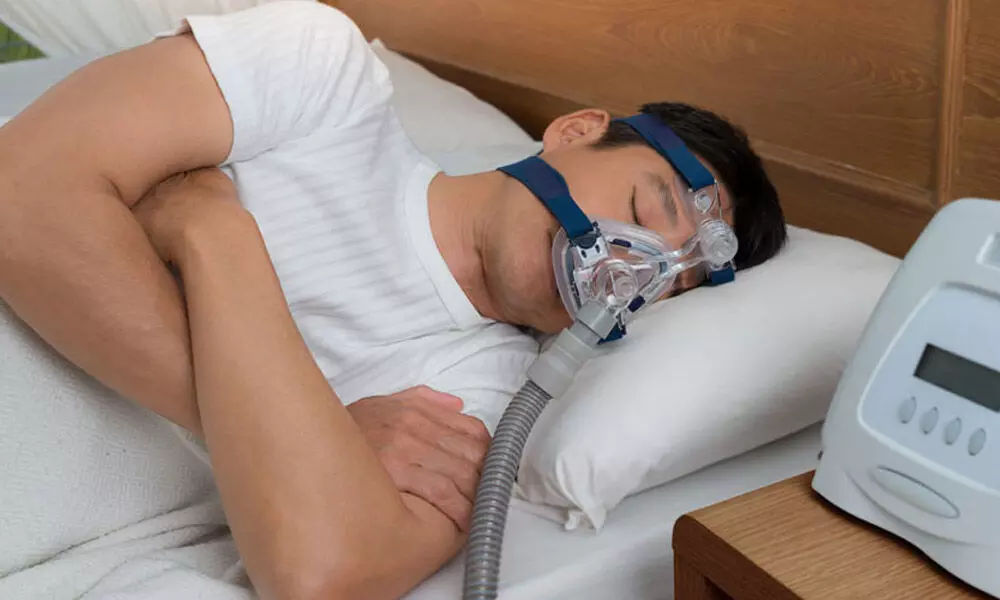What is sleep apnea?

Sleep apnea is one of the serious sleeping disorders, which tend to affect individual’s respiratory system
An adequate amount of sleep Is very significant in order to lead a healthy life, but numerous people tend to face difficulty in achieving proper sleeping pattern.
An adequate amount of sleep Is very significant in order to lead a healthy life, but numerous people tend to face difficulty in achieving proper sleeping pattern. Even after eating on time, and trying to sleep on time, many tend to feel sleepy whole day long. If you are also facing similar situation, it might direct towards the sleeping condition known as sleep apnea.
Sleep apnea is one of the serious sleeping disorders, which tend to affect individual's respiratory system. Sleep apnea, occurs in 10% of women worldwide and 25% of men. It can also affect people belong to all ages, even babies and elderly people. People having overweight large necks and structural abnormalities, which reduce the diameter of the upper airway such as nasal obstruction, enlarged tonsils or a small jaw with an overbite are prone to sleep apnea.
People having sleep apnea might experience repeatedly stopping and starting their breath. They also snore very loudly and feel tired even after proper sleeping hours. As per the Cleveland Clinic, this disorder may also lead to heart problems and high blood pressure. Experts explain sleep disorder is categorized into 3 different types as shared below.
Obstructive sleep Apnea: this type of apnea is a very common form, which occurs when throat muscles relax.
Central Sleep Apnea: when your brain is not able to send proper signals to the muscles controlling breathing. It causes central sleep apnea.
Complex sleep apnea syndrome : This condition is also known as treatment-emergent central sleep apneal , it appears when someone has both obstructive sleep apnea as well as central sleep apnea.
Sleep Apnea indicated varied types of symptoms. Signs and symptoms of obstructive as well as central sleep apnea can overlap. Due to this, it has become difficult to identify, the exact type, which one might be suffering with. The most common signs, as well as symptoms of obstructive and central sleep apnea, includes
• Loud snoring
• Another individual might notice you stop breathing while sleeping and gasping for air during sleep.
• Excessive daytime sleepiness
• Difficulty in focusing while working
• Awakening with dry moth
• Irritability
• Night sweating
• Feel Choked after waking up
• Mood disturbance
• Frequent nighttime urination
Symptoms in Children might differ when compared to adults, few of them are
• Child might not perform well at school
• Feeling sleepy during the class and mostly confused with laziness
• Difficulty in swallowing and daytime mouth breathing
• Inward movement of the rib cage when inhaling
• Unusual sleeping positions, such as sleeping on the hands and knees or with the neck hyper-extended
• Excessive sweating at night
• Learning and behavioral disorders such as hyperactivity, attention deficit.
Causes
Obstructive sleep apnea tends to occur, when there is a blockage in the airways and the soft tissue in the rear of the throat area collapses during the sleep. All those patients who are suffering from central nervous system dysfunction, such as following a stroke or patients having neuromuscular diseases such as amyotrophic lateral sclerosis, are prone to obstructive sleep apnea. It also common in patients having heart failure and other form of heart, kidney or lung disease.
Diagnosis
If one shows the symptoms of obstructive sleep apnea, your doctor might ask you to receive a sleep evaluation with a sleep specialist or might order an overnight sleep study to objectively evaluate for sleep apnea.
Treatment
Treatment for obstructive sleep apnea might focus on normalizing breathing during sleep and addressing the root cause or underlying health issues. Medical professionals suggest lifestyle changes such as quitting smoking, developing healthy sleeping habits, managing weight, limiting consumption of alcohol and following heart healthy diet. Medicines such as Acetazolamide, zolpidem, triazolam are prescribed. Without consulting the sleep expert, one should not take any of drugs, which would help them to sleep. Professionals might also suggest surgery, continuous positive airway pressure therapy (CCPAP), using an oral Appliance (MR) Mandibular repositioning device.

















